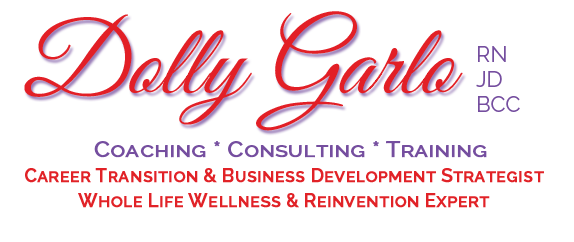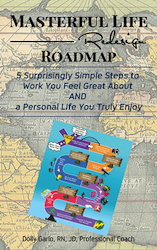Whole Life Planning – It’s Not What You Think

Maybe it was my foundational education as a registered nurse that turned me into the ‘queen of whole life planning.’ Coupled with becoming a lawyer and practicing what I learned about how to identify every problem that could befall a person or situation, I had to take “holism” to a new, more positive, level. But there’s certainly truth in the old saying “we make plans and God laughs.” So let’s explore why whole life planning is not what you may think.
The Plans That Got Away
First of all, what about all those plans that went awry? We’ve probably all made plans to do something only to have other unanticipated things come up. When you consider that, planning a whole life may seem not only like an impossibility, but a true folly.
I truly get it. But perhaps that’s because you’re thinking about it in the wrong way.
Planning is a process, as is executing that plan. It is in the process – the implementation – that things come up. What we planned (indeed maybe ‘counted on’ happening) can take unexpected twists and turns. Often those twists are disappointing turns. Rarely do we say:
“Oh goodie. That didn’t go where I expected it to go. What an adventure, what a ride!”
 But what if you could say that – or at least know precisely what to do with glitches in your plans? Read on, because that is what I mean when I talk about Whole Life Planning – or any planning really, for that matter.
But what if you could say that – or at least know precisely what to do with glitches in your plans? Read on, because that is what I mean when I talk about Whole Life Planning – or any planning really, for that matter.
Plans Have To Be Based On Something
Preferably, plans need to be based on something significant. Something important. Something meaningful. Otherwise, they can become just the long, boring to-do lists of life – like going to a job and doing work we hate all day, day after day.
That makes how you approach planning relative. As Albert Einstein is said to have explained it:
“When you sit with a nice girl for two hours you think it’s only a minute,
but when you sit on a hot stove for a minute you think it’s two hours.
That’s relativity.”
The significance of this to the subject of whole life planning is whether the basis of your plans is sitting with a nice girl (or handsome fella), or sitting on a hot stove – for whatever amount of time involved. Certainly, your whole life is a significant amount of time. And then, how whole that life is (especially looking back) becomes an exceedingly important consideration.

Is Your Planning Based On What You Want More Of?
Your plans for life have to be based on something you truly value. They probably always have been. Only, when you get into the implementation, the step-by-step of making them happen, it’s easy to get bogged down not just by the work of putting them in place, but the obstacles, problems and challenges that show up.
Because show up, they will. That’s an inevitable, not-if-but-when sort of thing. (In fact, it’s something to plan on, so to speak…).
For life, as in business, it’s about crafting the two most defining aspects involved in strategic planning: a vision and a mission. The mission is what we’re going to do – it leads to all sorts of activities like project design and tasks and steps to execute. But the mission has got to be based on the vision – that’s the ‘why we’re doing all this in the first place.’ Without being clear on why, it’s much easier for plans to go awry.
Whole Life Planning Derives From Your Personal Vision
Knowing that ‘why’ for your life is about being exceptionally clear about what you value. Note, that this is largely fixed for most people; and it can change and shift a bit over time. What you value when you’re in your mid-twenties may differ slightly from what you value at mid to late career when your children (if any) are more independent and you have the opportunity to look at your life ahead again… with a different set of eyes, experience and expertise. But quite likely, what’s fundamentally important to you in life will have been with you for a very long time, and will continue.
The possibilities you can see ahead, or want to choose from the available array, may differ. That’s why examining your values, and being clear about them is so important. They serve as the basis for those choices. They underlie the plan of action, and how you respond to the obstacles and challenges to make decisions as you move forward.
With clients, one of the tools I use is something called the “I-N-W-V Model,” which goes like this:
First, set aside your wants – even though it may finally be time to get what you really want in life. Instead, spend the time to fully restore the integrity of WHO YOU REALLY ARE. It may take some honesty and courage, to do a thorough self-examination and personal inventory for that, though it will be easier on this stage of your life than any before now. Get to know yourself and what’s important to you NOW – what can be left in the past, and what will truly guide you forward.
Then identify and get your needs met – what do you really need now, and what will it take to meet them fully, more than enough, with a reserve? What feels truly abundant to you?
In answering these questions, needs will cease to ‘drive you’ and will essentially disappear. With those out of the way, you also won’t want much anymore (since wants are often confused with needs). What you do want, you will get more easily.

Primarily, spend time to clearly identify what you value, so you can seek out and insert your values into life wherever you can. Get help, use surveys, checklists or assessments that help clarify and confirm, to speed up the process and make it easier. Doing that will help you not only identify next steps, but make choices and decisions along the way.
Values are like your constant, your north star – they keep you on track going in the direction of what’s really important.
If it’s not possible to fully engage your values because of people, places, things or circumstances outside yourself, you will likely notice your life energy diminishing. You may choose to disconnect wholly or partially from those outside factors. That, in turn, actually restores your Integrity and reduces your Needs!
But making those changes (and the manner in which you do) actually works best when acting in concert with what you value.
So whole life planning is less about the planning and execution of to-do’s, and more about finding and following your guiding star. It’s less about linear activities and logical next steps, and more about what’s in your heart. Once you are certain about that, you can move steadily in the direction of your true desires, and know exactly what to do when you get knocked off track.
The right steps will continue to appear on the path ahead that’s illuminated by starlight…


